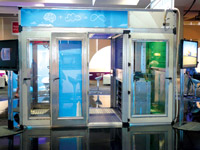News
Azure: Microsoft Bottles the Cloud in an Appliance
Partners HP, Dell and Fujitsu will deliver 900-server, private-cloud enclosures running Windows Azure and SQL Azure services.
- By Jeffrey Schwartz
- August 01, 2010
Addressing some of the key objections to cloud computing, Microsoft unveiled plans for its Windows Azure platform to be available as an appliance that can run on customer and partner premises.
At its Worldwide Partner Conference (WPC) in July, Microsoft revealed its intentions to offer what it calls the Windows Azure Appliance, which Microsoft has talked up conceptually for several months. The appliance will be offered later this year by key partners -- initially Dell Inc., Fujitsu Ltd. and Hewlett-Packard Co. The appliance will enable private clouds based on huge turnkey systems equipped with the Windows Azure and SQL Azure services running on self-contained server, storage and network infrastructure. eBay Inc. said it, too, will use the appliance.

[Click on image for larger view.] |
| Figure 1. The exterior of the Windows Azure Appliance was the centerpiece of the Expo Hall at the Microsoft Worldwide Partner Conference in July. OEM partners plan to start filling the appliance enclosures with servers, storage and networking and offering them to customers later this year. |
"The Windows Azure appliance fundamentally takes the Windows Azure service and extends it," said Bob Muglia, president of the Microsoft Server and Tools business, speaking in the opening WPC keynote in Washington, D.C. "It extends it to our service providers, allowing you to have exactly the same capabilities within your datacenter, providing that capability to your customers; and it can be extended to our larger customers that want to provide IT services within their own organizations."
Details of the new appliance were vague, including cost, configuration and how it will be rolled out to customers. Muglia did say the hardware for the new appliance will be specified by Microsoft, allowing service providers to either offer their own hosted Windows Azure-based services or provision the appliances initially to large datacenter customers on-premises. The availability of such private cloud implementations addresses issues of control and compliance that have made cloud computing unfeasible for many corporate and government customers.
"The benefits are associated with control, compliance and keeping the data locally -- data sovereignty. These are important benefits that allow for much more extensive solutions being built around this cloud environment," Muglia said.
For eBay, the appliance will ease deployment without moving its huge auction and PayPal payment processing service off-premises. "If I want to deploy an application today for eBay.com within my datacenters, I need to secure the hardware, provision a network, hook up the load balancer and make it part of the infrastructure," said James Barrese, eBay VP of technology, speaking at a press conference following the keynote.
Dell, Fujitsu and HP all plan to offer the appliances later this year, based on predefined hardware specifications by Microsoft. The hardware vendors said they see opportunities for both offering hosting services to customers as well as selling systems to very large enterprises such as government agencies and large corporations. Though the companies aren't discussing the configurations, the initial implementations will house just shy of 1,000 servers, Muglia said.
One partner that appeared totally surprised by the launch of the appliance was Harry Zarek, CEO of Toronto-based Compugen Inc. When he was approached on camera by Microsoft Channel Chief Jon Roskill, Zarek said, "We've been a Microsoft partner for 20 years, having gone through the traditional product resale and service support. We had a fear that this business was going to trickle through our hands and move into the datacenter. We had a big question [about] what we would be left with. This is the missing link: This is the piece we need to give us the destination over the next few years in the cloud, and we have an important role to play."
Muglia said the cloud has forced Microsoft to reinvent itself and will require its partners to do the same. "It's a change that's inevitable, it's a change that allows us all to deliver new value, it's a change that thankfully is not happening overnight and it's a change we will embrace together," he said.
About the Author
Jeffrey Schwartz is editor of Redmond magazine and also covers cloud computing for Virtualization Review's Cloud Report. In addition, he writes the Channeling the Cloud column for Redmond Channel Partner. Follow him on Twitter @JeffreySchwartz.